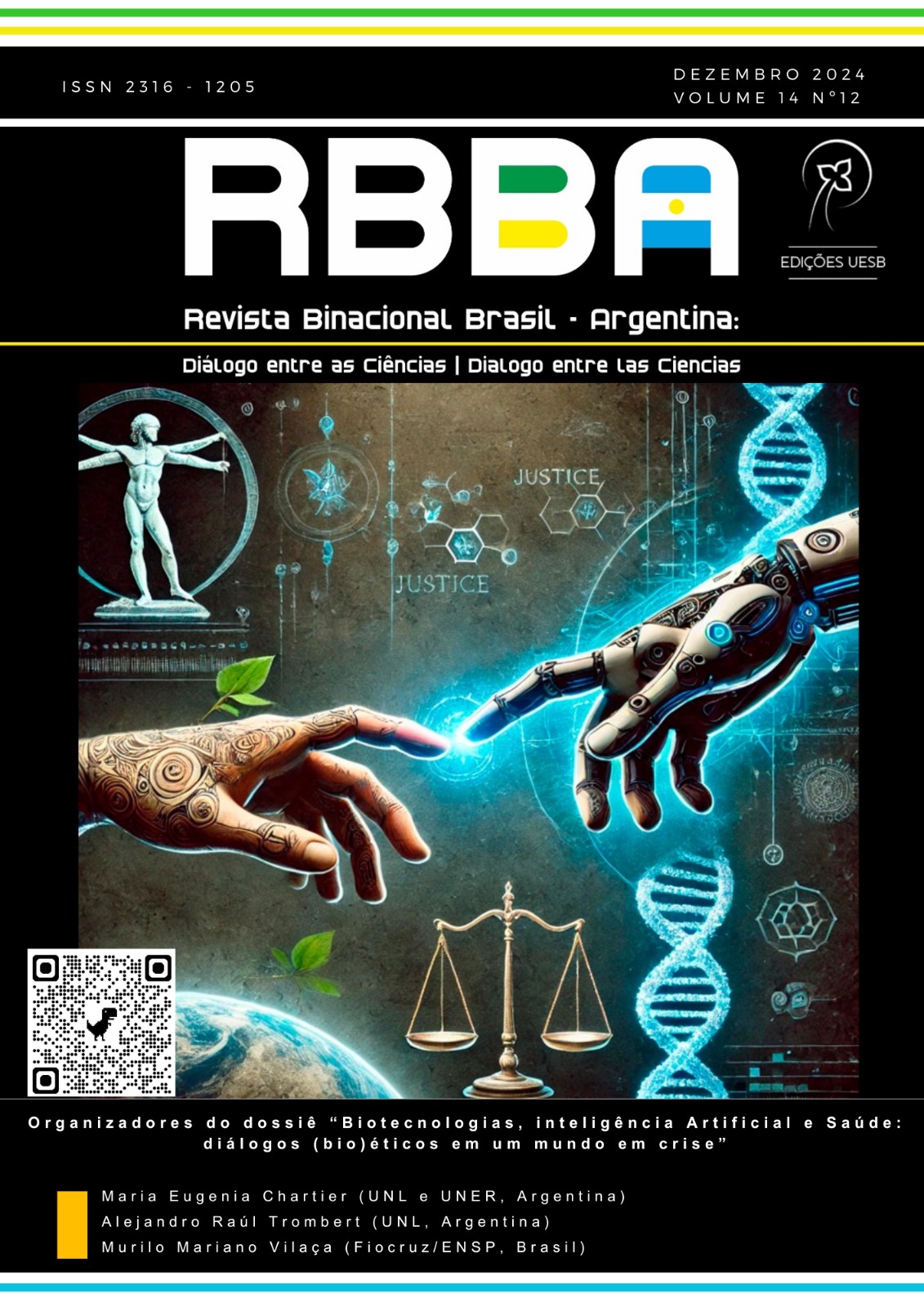Technological convergence and health: bioethical challenges in a context of transformation
DOI:
https://doi.org/10.22481/rbba.v14i2.15520Keywords:
Converging Technologies, Bioethics, HealthAbstract
In the 21st century, Technological Convergence (TC)—encompassing nanotechnology, biotechnology, information technology, and cognitive sciences (NBIC)—is profoundly transforming society. As these fields integrate, they create new possibilities for science and technology, shaping humanity's future. The relationship between scientific progress and ethical risks, such as distributive justice dilemmas and privacy concerns, becomes increasingly relevant in the context of accelerated technological innovations. TC suggests a scenario where health, biotechnology, and artificial intelligence converge to transform the human body and expand its capabilities, while also raising important bioethical issues, such as equitable access to technologies and the preservation of human dignity. In times of global crisis, reflecting on these innovations and their impacts is essential to ensure that the benefits are widely shared, maintaining a balance between technological advancement and human values.
Downloads
References
ALEXANDRE, Laurent. A morte da morte: como a medicina biotecnológica vai transformar profundamente a humanidade. Tradução Maria Idalina Lopes Ferreira. Barueri: Manole, 2018.
BAR-YAM, Yaneer. Unifying Principles in Complex Systems. In: ROCO, Mihail C.; BAINBRIDGE, William S. (Org.). Converging Technologies for Improving Human Performance: Nanotechnology, Biotechnology, Information Technology and Cognitive Science. Dordrecht, 2003.
CAVALHEIRO, Esper A. A nova convergência da ciência e da tecnologia. Disponível em: http://www.scielo.br/scielo.php?script=sci_arttext&pid=S0101-33002007000200004. Acesso em 21 Out. 2024.
CLARK, Andy. Natural-born cyborgs: Minds, technologies, and the future of human intelligence. New York: Oxford University Press, 2003.
GOLDACRE, Ben. Ciência picareta. Tradução Renato Rezende. Rio de Janeiro: Civilização Brasileira, 2013.
GINGRICH, Newt. Vision for the Converging Technologies. In: ROCO, Mihail C.; BAINBRIDGE, William S. (Org.) Converging Technologies for Improving Human Performance: Nanotechnology, Biotechnology, Information Technology and Cognitive Science. Dordrecht, 2003.
KURZWEIL, Ray. A Era das Máquinas Espirituais. Tradução Fábio Fernandes. São Paulo: Aleph, 2007.
MARQUEZ, Gabriel García. Cem anos de solidão. Tradução Eric Nepomuceno. 91ª ed. Rio de Janeiro: Record, 2015.
NICOLELIS, Miguel. Muito além do nosso eu: a nova neurociência que une cérebros e máquinas – e como ela pode mudar nossas vidas. Tradução do autor. Revisão Giselda Laporta Nicolelis. São Paulo: Companhia das Letras, 2011.
NORDMANN, Alfred. Converging Technologies – Shaping the Future of European Societies. European Commission Research, 2004.
OECD. Framework for Anticipatory Governance of Emerging Technologies. OECD Science, Technology and Industry Policy Papers, No. 165. Paris: OECD Publishing, 2024. Disponível em: https://doi.org/10.1787/0248ead5-en. Acesso em: 29 out. 2024.
PEARSON, Ian. You Tomorrow: The future of humanity, gender, your everyday life, your career, your belongings and your surroundings. 2ª ed. Self published: Wroclaw, 2013.
ROCO, Mihail C.; BAINBRIDGE, William S. Converging Technologies for Improving Human Performance: Nanotechnology, Biotechnology, Information Technology and Cognitive Science. Dordrecht, 2003.
ROTHBLATT, Martine. Virtualmente humanos: as promessas: e os perigos: da imortalidade digital. Tradução Jeferson Luiz Camargo. São Paulo: Cultrix, 2016.
SPOHRER, Jim. Advances in Converging Technologies. Em: ROCO, Mihail C.; BAINBRIDGE, William S. (Org.) Managing Nano-Bio-Info-Cogno Innovations: Converging Technologies in Society. Dordrecht, 2003.
WILSON. Edward O. A conquista social da Terra. Tradução Ivo Korytovski. 1ª ed. São Paulo: Companhia das Letras, 2013.
Downloads
Published
How to Cite
Issue
Section
License
Copyright (c) 2024 Revista Binacional Brasil-Argentina: Dialogue between the sciences

This work is licensed under a Creative Commons Attribution 4.0 International License.






